The best Assassin's Creed games, ranked
The definitive list of the best Assassin's Creed games
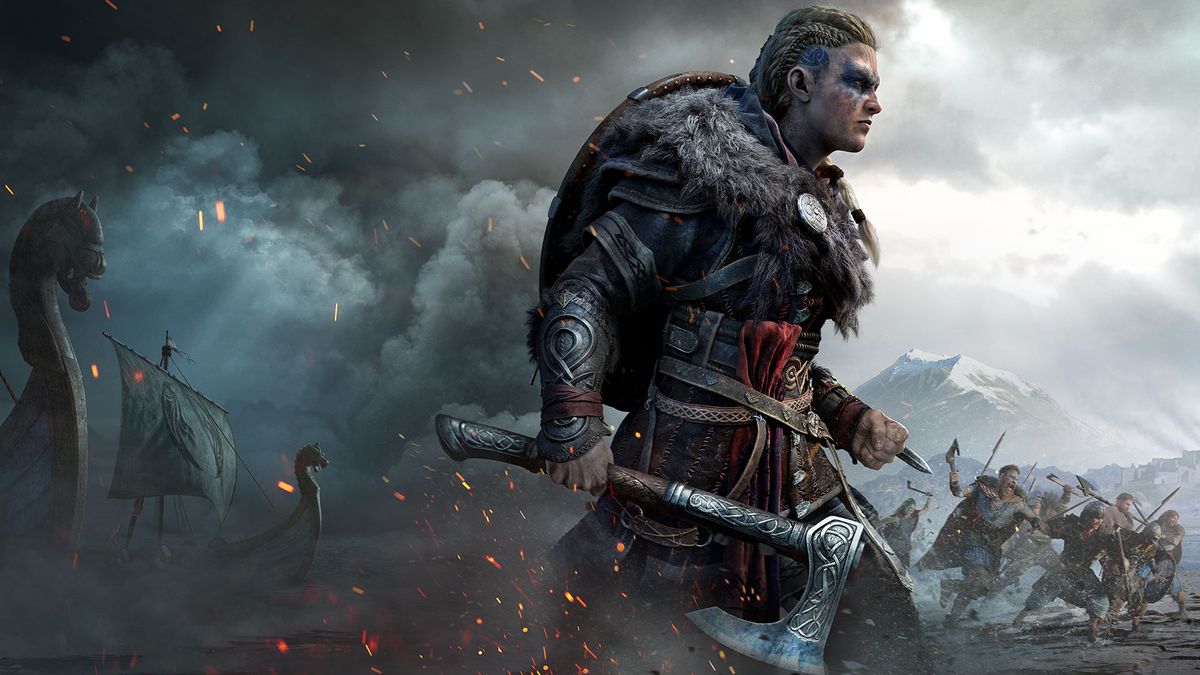
Ranking the best Assassin's Creed games is harder than finding a hundred feathers in Renaissance Italy, but we've somehow managed both. In recent times picking a favorite stabby adventure has only gotten tougher, with Origins and Odyssey - and now Assassin’s Creed Valhalla - continuously expanding and improving on the original historical RPG formula. The best Assassin's Creed games today look very different from how the series began, giving your choices serious consequences and allowing you to make your assassin hero your own.
Some of it comes down to the historical period you enjoy exploring the most, would you rather spend your time in the streets of Victorian London, or climbing statues in the sunny climes of Ancient Greece? Perhaps it's about which hero you have the biggest crush on, the dashing Ezio or the noble Bayek? For some, it will come down to the mechanics, and just how satisfying the game makes taking out the target before they even know what's happening.
We've summoned our eagles and the odd raven to scour the world for the very best Assassin's Creeds games, and we've got 21 - plus an honorable mention - for you to explore. Let's dive in, ideally from the top of the tallest landmark on the map, and into a nice, conveniently placed cart of hay.
Honorable Mention - Freedom Cry
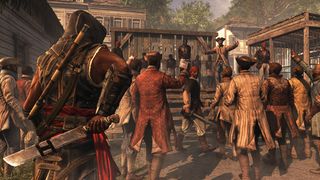
This one was a tough call, because Freedom Cry was born as Assassin's Creed 4: Black Flag DLC, but had bigger ambitions and eventually became a standalone title. While its combat and sidequest structure make it all but inseparable from Black Flag, it deserves an honorable mention for its story alone. Here, former slave Adewale stands against the slavemasters of Haiti in the name of freedom, proving that the Assassins' mission can take on many important shapes.
Freedom Cry puts you in the thick of a slave trade and is unflinching in how it depicts that brutality. You can't miss the human auctions or runaway slaves who will be killed without your help, and being a participant rather than an observer makes it impossible to ignore. But perhaps most importantly, Freedom Cry shows how those slaves and the nation's freemen are active participants in their own liberation, working with Adewale rather than waiting passively. In that regard, Freedom Cry does something that is not only important, but almost entirely unique, and that deserves a shout out.
21. Assassin's Creed Altair's Chronicles

Before Ezio's trilogy was a twinkle in the eyes of the AC development team, there was Altair's Chronicles. The mobile prequel to the original Assassin's Creed, it sees Altair hunting for a mythical artefact called The Chalice in constricted 3D world. It's a disaster from start to finish: Assassin's Creed's combat is simplified down to the point that it's no longer interesting, locations and missions are same-y, its story (complete with forced romance) is hackneyed, and the dialogue is consistently awful with occasional forays into Vader ‘Noooooooo!’ territory.
The one thing Altair's Chronicles sort-of has going for it is visuals, including lovely (if overused) environmental designs, which at least make it aesthetically-pleasing. But that's not nearly enough to make up for its many and varied shortcomings, and with new mobile AC games surpassing its visual quality, it’s best to give this one a pass.
Sign up to the 12DOVE Newsletter
Weekly digests, tales from the communities you love, and more
20. Assassin's Creed Identity
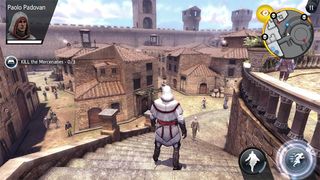
Assassin’s Creed Identity launched on iOS with the intent to be more like the full-blooded console releases, albeit with an RPG spin. Set in the Italian Renaissance, Identity attempts to recreate the series’ signature sneaking-and-stabbing gameplay, shrunken down for shorter sessions. Ezio’s been swept aside for custom-created characters, each brought to life using a marvellous Italian name generator.
Sadly, you’ll probably spend more time messing around with that than you will the actual game. It’s a free-to-play affair, sending you to and fro to eliminate some guy / collect this artifact / escort this person in exchange for skill points you can spend on outfits, equipment, and move-sets. Spotty controls result in a lot of running into walls rather than up them, but at least you won’t have to avoid the usual swarm of civilians - there’s barely anyone in the streets, meaning that it’s up to the flat textures and boxy buildings to build the atmosphere.
19. Assassin's Creed Chronicles: Russia
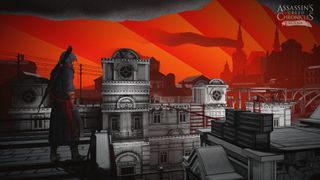
The final side-scrolling stealthy spin-off (say that three times) from Ubi and Climax Studios, Chronicles Russia is gorgeously drawn in the hues of 20th century propaganda, but fiendishly difficult. The sneaky quest of Nikolai Orelov in 1918 Russia, this is actually the most modern Creed adventure to date. Orelov is, of course, still an Assassin, complete with hidden blade but just to shake things up he's armed with a rifle for picking off enemies from afar and a winch for yanking doors off grates to sneak through.
There's plenty of satisfying Assassin-ing to do here but Chronicles Russia manages to be the worst of the arty trilogy with some seriously infuriating difficulty spikes if you choose to do anything other that, well, spike your enemies silently. Add in some frustrating timed levels and the interesting Assassin's lore and new characters become bogged down by an experience that just feels like it hasn't been thought through quite hard enough. Unlike Chronicles China or India, both fun stealth side scrollers in their own right, this one is for fans of the Brotherhood only.
18. Assassin's Creed 2: Discovery

If you only played the Assassin's Creed mobile games, you might get the idea that the series' trademark is side-scrolling your way through corridors of oblivious guards/corpses-to-be. Assassin's Creed 2: Discovery won’t do much to dispel that notion; you play as Ezio, conducting assassination missions for a series of clients, all of which are nondescript and ultimately unimportant. They just act as vehicles to push you into a 2D platformer that takes on a few infinite-runner qualities, if you feel like charging in full steam and destroying every barely competent guard you meet.
It's a simple game that doesn't have the depth of most Assassin's Creed titles, but it does accomplish what it sets out to do. Creating a smoother, more interesting platforming experience than the mobile companion games, Discovery set the standard for 2D Creed games back in 2009. It's since been bypassed by the superior Chronicles: China, but might still be worth a play if you can find a DS copy, since Ubisoft has since removed all evidence of the mobile version.
17. Assassin's Creed Bloodlines
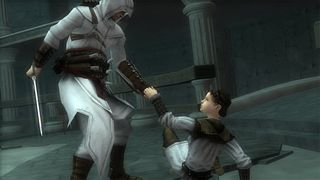
Released alongside Assassin's Creed 2 and Discovery in a calculated assault on everyone's wallets, Bloodlines on PSP continues Altair's story following the events of the original game. As opposed to previous handheld/mobile entries in the series, Bloodlines tries to approximate the 3D look and free-for-all gameplay of the console releases. In the case of the former, it does a decent job, with crisp visuals that make it look like a true AC game but when it comes to gameplay, Bloodlines misses the haystack: small environments funnel you into battles constantly and the combat system means fights often feel as ungainly as hand-stitching in oven mitts.
Plus, while Bloodlines does have an involved story that's not as awful as Altair's Chronicles, it often falls flat and isn't strong enough to make up for the lacklustre combat. The game's one saving grace is Maria - Altair's sharp-tongued associate who fans might remember from a certain dream sequence - whose interactions with Altair give the story some life and depth. Sadly, even she's not enough to save the production.
16. Assassin's Creed Chronicles: India

Acting as part two of the three-part Assassin's Creed Chronicles mini-series, Assassin's Creed Chronicles: India is the franchise's first foray into what was, at the time, the Jewel in the Crown of the British Empire. Unfortunately, you'll only see a limited amount of it, because main character Arbaaz's linear, 2.5D path doesn't leave room to explore much of anything. Beautiful backdrops and a satisfying sense of movement make up for that somewhat, but that only does so much to fix the game's other pressing issues.
Forcing you to suffer through unsatisfying, sloppily designed missions, the tedious stealth ‘option’ is basically mandatory. Chronicles India punishes you for even attempting to liven things up with combat, handing out automatic low scores or outright failure for your efforts. And in a game where points are directly tied to important upgrades, that just feels like bullying. Clumsy attempts to up the tension - like forcing Arbaaz to run slower than he did five minutes before, for no reason - lead to even more frustration, and awkward pacing makes the game drag horrendously. Falling short of its predecessor, Chronicles China, in almost every respect, this is an entry you can safely vault right over.
15. Assassin's Creed Pirates

It takes serious confidence to slim down a mini-game from one of your previous titles and release it on its own. But Ubisoft was riding high on the crest of Black Flag's success in late 2013, and the result was Assassin's Creed Pirates, a mobile game that is just Black Flag's ship combat, playable on the go.
Pirates does try to be a proper Assassin's Creed game, with a story involving Assassins, Templars and magic DNA time machines, but that's just window dressing - you spend 99% of your time shooting cannonballs at other ships just 'cause. But the designers knew that, and so they made a point of prioritizing the combat and making sure that controlling ships via touch features feel simple and natural. Pirates sits low on this list because it’s just a facet of another Assassin's Creed game, but that facet is so well designed that it deserves recognition.
14. Assassin's Creed 3

Assassin's Creed 3 is, in many ways, a test drive. It was the first Ezio-less Assassin's Creed in five years, the first set in a populated wilderness (fields in Italy don’t count), and the first to feature the series' now beloved ship combat. It does a lot of things right, creating a Frontier you can explore for hours, and it’s sensitive to Kanien'kehá:ka culture. Unfortunately, it gets a lot of other things - fundamental, obvious things - very wrong.
Main character Connor is often too aloof and superior to be sympathetic, and the amount of times he steps in to save the incompetent Founding Fathers is hard to take seriously. The game contains sections that emphasize stealth, but the actual stealth controls are poor, so these parts are far more annoying than fun. And, hurting from a tight development schedule, the game shipped with enough bugs to make an entomologist swoon. Sadly, the way it controls is awkward at best and game-breaking at worst and let's not even talk about how climbing every tree is exactly the same. AC 3 has a lot of good ideas - crafting, ships, a working eco system - and a fascinating time period but is ultimately disappointing. Sorry Connor.
13. Assassin's Creed Liberation
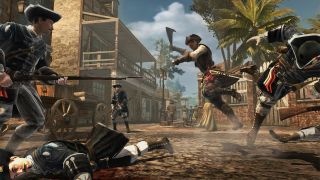
Assassin's Creed Liberation might now be available on console but it still bears the marks of its time on the Vita. Aveline's combat is just as fluid and satisfying as some of the strongest Assassin's Creed games, and presenting its story as the Templars' altered version of events is one of the more clever lore twists offered up by the Creed but there's no escaping how cramped the game feels, both in physical size and its storyline.
One-woman-wonder Aveline is a fascinating character with a lot of gusto, but her motivations are never really made clear, and neither are those of her enemies. And with only one city, some outlying swamp, and a temple to investigate, it doesn't make you want to explore the world the way an Assassin's Creed game should. All told, it fits squarely in the middle of the Creed quality scale: not great, but not terrible, and serviceable for fans in need of an AC fix.
12. Assassin's Creed Rogue
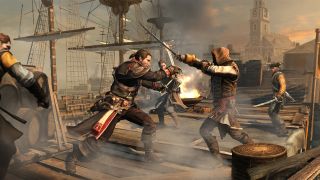
If you got your first look at Assassin's Creed Rogue with no context, you might come away thinking it's Black Flag DLC. That isn't too far from the mark - the story of an Assassin-turned-Templar named Shay Cormac, Rogue focuses on the period of time between Black Flag and AC3, and lifts heavily from Black Flag's trove of assets. Ship combat is virtually the same, music and sound effects are extremely similar, and Shay fights the same way Edward does nearly stab for stab. It's just much colder and don't go swimming in the North Atlantic. It's really not as nice as the Caribbean and will KILL you.
With Black Flag's style of combat and exploration on the way out with the release of Unity, some fans hail Rogue as a welcome retread, and it does a standout job of replicating Black Flag's best parts. Plus, new environments like the North Pole, and minor additions to ship combat, give those mechanics a little extra juice without changing them too much. There's also the fact that it effortlessly sees off some of the North American arc's most beloved characters which makes for welcome fan-service. Throw in the nicely reversed element where you're constantly at risk of being slaughtered by Assassins and Rogue is definitely still worthy of your eagle vision.
What's our top pick? Click 'next page' to conclude our countdown of the best Assassin's Creed games.
12DOVE was first founded in 1999, and since then has been dedicated to delivering video game-related news, reviews, previews, features, and more. Since late 2014, the website has been the online home of Total Film, SFX, Edge, and PLAY magazines, with comics site Newsarama joining the fold in 2020. Our aim as the global GamesRadar Staff team is to take you closer to the games, movies, TV shows, and comics that you love. We want to upgrade your downtime, and help you make the most of your time, money, and skills. We always aim to entertain, inform, and inspire through our mix of content - which includes news, reviews, features, tips, buying guides, and videos.
